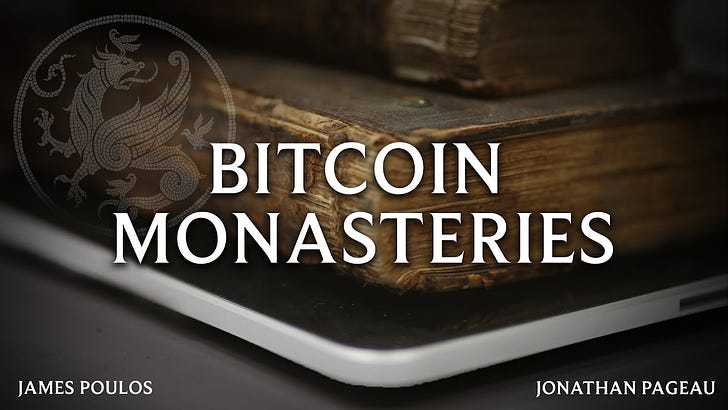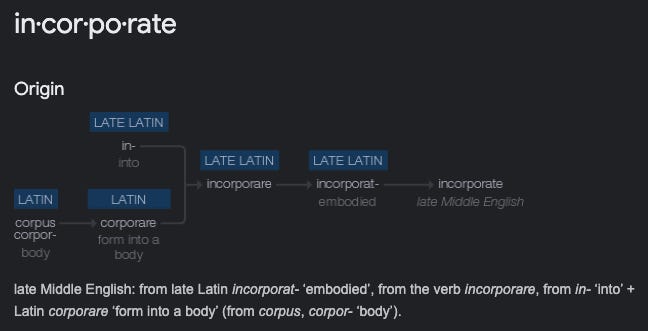Spiritual Authority Over Technology
Who will w̶a̶t̶c̶h̶ program the w̶a̶t̶c̶h̶m̶e̶n̶ programmers?
I recently watched this interview Jonathan Pageau gave to James Poulos. I was hoping it would be more of a dialogue, but it was directed more one way.
That’s alright. I will try to categorize and respond to this conversation as I see fit.
I. The Motivating Question
(4:30) “By what authority can you claim convincingly and legitimately, in the eyes of your people, to establish or extend your sovereignty over the technology within your borders?”
This is the fundamental question being explored. I will cut to the “end of the talk” where James concludes that the answer to this question must be necessarily theological.
I should come clean out-the-door and admit that I have not purchased or read James’ book, Human Forever. I probably ought to, but I don’t think I can give it the respect it deserves right now – he cites a lot of heavyweight French philosophy (McLuhan, Baudrillard, and Ellul) that I don’t have the bandwidth to absorb and metabolize it in the right ways at the moment.
On a side note, if you want to learn more about Ellul and the “Problem of Technology” (more broadly, the problem of technique), my friend
has done quite a thorough exposition of this topic on his Substack.(6:52) There’s one other religious framework that has been thrust to the fore by digital technology … it is worship of technology itself. This is what we are seeing come out of Silicon Valley, and specifically OpenAI.
But, back to the motivating question: by theological, James means a couple of specific things.
The answer to who ‘has and wields authority over technology’ must necessarily come from outside the purview of technology. This is in contrast to much of the thinking that came out of the 18th and 19th centuries claiming that modalities of science, technology, and capital are self-justifying. The point here is that James identifies technology as apart from God (i.e., that which is Absolute and the source of all authority within and beyond Itself).
The answer to who possesses and distributes this outside authority over technology must be embodied. By embodied, what is meant is that the body itself (of whichever size or scale) is what claims and enforces authority. This could be an individual body, a family body, a racial body, a community body, a national body, etc. James suggests that the most appropriate body for this authority is a spiritual body; and, specifically the body of Christ – not a surprising proposal from a Greek Orthodox fellow.
A couple of immediate implications derive from this second point:
The need for embodied authority corresponds to the acknowledgment that physical reality is ultimately subject to ‘hard power’, not just ‘soft power’, directly countering many gnostic post-modern allegations that reality can be mediated entirely by symbol, language, idea, etc. Most importantly, this implies existence cannot be purely digitalized, insofar as the digital is precisely that which lacks a body.
Any authority that ‘lesser’ bodies choose to exercise over technology must find their source from this ‘greater’ spiritual body. For example, if you are the head of a clan, then you must stake a claim on how digital technology (e.g., a distributed computer network) manifests to the extent that and in the same way that you are claimed by and belong to the spiritual body that provides your clan power.

To the untrained American mind, this perspective seems to be some sort of appeal to monarchy or governmental absolutism, similar to what Imperium Press desires so badly – horrifyingly so.
I don’t see James’ answer including any claims about the ideal mode of governance, though. Instead, he is more focused on engaging in the practices useful to commune with spiritual authority – e.g., priestly confession. That is to say, he validates the importance of orthopraxy (praxis, πρᾶξις, practice) over orthonomy, (nomos, νόμος, law) or even orthodoxy (dóxa, δόξα, belief).
(25:07) It will be worth our while to bring to the attention of some people spiritual solutions – or a least spiritual practices – that will be able to stand up in the face of technology and say, “No, there is a higher authority,” and this is how it can operationalized in your life right now.
II. The Western Reliance On Perfect Law
One reason that Americans, are struggling to grapple with the problem of self-justifying digital technology, is that they are used to trying to perfect the law and calling it a day. I did not grasp this American obsession with law as the highest good until reading Oswald Spengler and then listening to James discuss some history with Jonathan.
Many Westerners have become accustomed to just getting the principles right, and assuming that individuals who use their rights to follow these principles will be rectified. It seems that this attitude of ‘law as the highest good’ is a specific malaise derived from Anglican cultural evolution and Puritan morality.
I’m pleased that James made this point.
(27:50) What is ‘wokeness’ is if not a purification of the individual through purification of the law, specifically civil rights law?
(26:54) What is computer code if not a more rational, more abstracted, more impartial form of law?
I’ve chosen the word malaise specifically, because coming from the perspective of Dharmic civilization, this compulsion toward perfection through external law often feels diseased1. Salvation does not arrive via policy.
Bodies have living relationships with each other. Moreover, there is no quantity of rules, codes, or laws that can capture this genuine, evolving relationship between bodies. Relationships are not like colors that are purely additive or subtractive.
If X and Y are in a living relationship, then X plus Y takes on a life and body of its own that is not reducible to either X or Y. This is because ‘X’, ‘Y’, and ‘X & Y’ all co-derive form and functionality from each other.
Another way of putting this is as follows: you and your friend are both organisms, but your friendship is itself an organism. The friendship has an ‘embodied individuality’ that is distinct from but co-equal to the friends. This applies to all other relationships, too: parent-child, teacher-student, husband-wife, employer-employee.
Since this is the case, it must certainly apply to God, if God is to mean anything substantial. Duality gives rise to trinity, and trinity cannot ever be reduced to duality without losing something fundamental.
In fact, to the extent that X and Y are not in a genuine embodied relationship with each other, there will be increasing attempts to codify the engagement between them – usually through ideology or commandments – and this attempt at codification will always eventually fail, because it doesn’t invite ‘X & Y’ to participate as a co-equal partner.
As soon as I write down a law, I must consider my relationship to the law – and its relationship to me – as something distinct.2
Furthermore, if duality gives rise to trinity, then trinity gives rise to sexternity; “mother, father, and child,” becomes six beings to attend to each other3.
Indeed, if you want to look at this from a mathematical perspective, the emergence of O(n) individuals gives rise to O(n!) relationships. This factorial explosion is why, at some point, for the web of relationships to thrive it must be brought back and grounded into unity.
The Tao that can be told is not the eternal Tao.
The name that can be named is not the eternal name.
The nameless is the beginning of Heaven and Earth.
The named is the mother of the ten thousand things.
– Lao Tzu, Tao Te Ching
III. Revolution As Will-To-Enslavement
(9:07) It seem to me that that part of what’s going on with regards to technology is the playing out of the revolutionary trope that has set itself up since the Enlightment. One of the things we’ve fantasized about for the past century is that that things that are below us, that serve us would come up an take power from us.
To be enamored with revolution as the source of unitive legitimacy is to hope that one day those who you control will eventually rise up and control you.
If you are the one controlled, you may try to hasten revolution out of power lust. If you are the one controlling, you may try to stave off revolution out of fear. However, strangely enough, if you are the one controlling, you may also hasten the revolution!
If you have a nihilistic perspective of your agency – in which you have tried to act as king, but you haven’t been able to enact utopia – you may secretly and desperately desire for your successor to come and dethrone you, to make you subhuman, or even to annihilate you; so that when you are finally put under their foot, you can cede all responsibility to engage in a world that remains fallen and imperfectible.
(10:30) I wonder if there is a mode of thinking that moves us toward a place that we dream or fantasize about being taken over because we believe in that pattern of being.
Right now, the dominant paradigm for modern humans is managerial control through technology. This notion of ‘control and manage’ is the inverse of the notion of genuine relationship that gives rise to ‘positive ownership’. Positive ownership involves using one’s agency to take another’s interest as one’s own. A gardener takes ownership of his plants. A samurai takes ownership of his blade. A concert performer takes ownership of his grand piano.
The more humans try to use technology as a slave, the more it returns the favor by capturing our impulses in ways that enslave us. We’re not willing to relate to technology – especially computers – and in turn, let it expand our capacity to be and become who we are through positive ownership.
When I lived in the Bay Area, I once went on a couple of dates with a bashful but rakish second-generation Japanese American bloke. One of the things we connected strongly on was our talent and pleasure of cooking.
The single most fascinating thing I learned from our time together was the Japanese method of ‘SA-SHI-SU-SE-SO’. I would be denigrating it by calling it a culinary system; it is instead one of the best examples of deploying cultural and linguistic ownership over technology to produce culinary mastery.
First of all, this method offers a way for someone to learn the fundamental structures of ひらがな (Hiragana), the oldest of the three Japanese scripts. Indeed, before I was even allowed to use this method, I was asked to learn how to write these five syllables and practice their pronunciation in order – A/I/U/E/O.
Secondly, this method orients your palate to the five fundamental tastes of Japanese cuisine – it acts as an olfactory calibration mechanism. Third, this method requires you to observe how different elements act as chemical reagents. Vegetables taste a lot different if you marinate them in sugar first before adding salt, compared to the reverse. If you want to find this out for yourself, try cooking green beans or eggplant in one order and then the other.
The experience of ‘SA-SHI-SU-SE-SO’ is one of relating to technique on interweaving levels as opposed to using technique to control. This experience is not equivalent to ordering Japanese takeout on DoorDash and having it delivered to your doorstep; its jurisdiction cannot be abstracted away, or codified into a rule book; nor should it be, given that proper food preparation is fundamental to a strong body.
Someone who treats their food – and more broadly, the elements that nurture him – with this type of reverence has no reason to fear that nature will try to come back and subjugate him in the form of decrepitude.
ब्रह्मार्पणं ब्रह्म हविर्ब्रह्माग्नौ ब्रह्मणाहुतम् । ब्रह्मैव तेन गन्तव्यं ब्रह्म कर्म समाधिना ।। अहं वैश्वानरो भूत्वा प्राणिनां देहमाश्रितः । प्राणापान समायुक्तः पचाम्यन्नं चतुर्विधं ।।
Oh Lord, Thou art the food, Thou art the enjoyer of the food, Thou art the giver and preparer of the food.
Along with the inward and outward breaths, You are the digestive fire that digests all types of food. We offer to You, all that we consume.
– Sanskrit Food Prayer
IV. Triumph Requires Incorporating Practice
(51:30) What would a world look like in which there is a spiritual authority helping us to integrate technology appropriately?
If you weren’t already convinced of the American addiction to jurisprudence, consider that corporations – that is to say, a legal construct that defines associations4 in a business context – have been the main body of American life for the last half-century. Almost everything regarding civil life has been through the purview or at the behest of a corporation: trade, research, innovation, family formation, leisure, nutrition, etc.
For a variety of interlocking reasons, this type of civil body can no longer be trusted or else it acts in ways to displace itself. Certainly, it doesn’t demonstrate a capacity to wield technology wisely.
In this absence and decay, the question transforms into: “Which new bodies will you belong to? How can you practice belonging to them? What degrees of authority can you derive from these methods of incorporation?”
These are practical questions.
I practice vipassana. I belong to a set of those who have found ways to develop more subtle senses and liberate sensory energy that has been otherwise captured. I join circles of breathwork practitioners who can witness and co-regulate with me. This is an attentional body.
I practice kickboxing and jiu-jitsu. I’m currently part of a network of teachers and students spanning four cities. I belong to a set of those in brotherhood establishing physical pliancy and agility. This is a mobile body.
I practice mechanical construction. I volunteer and freelance for a variety of church ministries that repair, renew, and rebuild homes. I belong to a set of those who find worship in employing their craftsmanship to serve their neighbors. This is a devotional body.
I practice making kombucha and yogurt. I exchange it for produce and eggs from local homesteaders. I belong to a set of tho who promote health and sustainability through agriculture. This is an alimentary body.
I practice writing and publishing. I belong to a set of those who express and refine their values in the hope of influencing others to creativity and rescuing themselves from stasis. This is a communicative body.
(50:08) Right now we need spiritual practices, and to turn up our nose and say, “Well, that’s not my tradition,” or “That seems a little weird,” – well, yes, it is a bit weird.
My friend
wrote a book called “Only The Weird Will Survive”. Weird is no longer a reason to avoid participating in forming a proper, forward-looking, restraining spiritual authority over technology. As someone who has never been able to fit into anywhere or anything my whole life, I’ve known this truth for a long time.I insist that other weird Americans grow into this truth.
They (or we) have a different set of diseases to attend to besides obsession with law.
Even though ‘dharma’ is often translated to mean ‘cosmic law’, implicit in this word is a valence of responsibility that treats the law as contingent on responsive breathing between the law and body subject to that law. This attitude is decidedly Nietzchean and anti-Platonic.
Consider, for example, that a mother must develop a relationship with the ‘person’ that is the father-child relationship; that this mother-to-(father-child) ‘being’ must live well alongside mother-to-father, mother-to-child, and father-to-child ‘beings’.
Sometimes, I wonder why Americans focus so much on the freedom of speech guaranteed by the First Amendment, much more than they do on freedom of association. One’s voice is very limited compared to one’s whole body.











